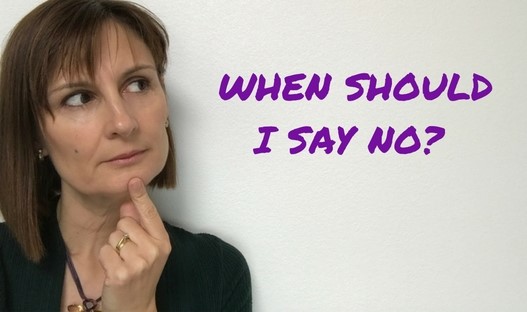Can’t see the video player above? Watch it on YouTube.
Transcript
Last week, we talked about how to say no to avoid being overloaded, potentially harming relationships, maybe even feeling physically or emotionally unwell.
So how to say no is really about communicating with other people.
This week I wanted to take a step back and look at how we communicate with ourselves, as in deciding when to say no. And I have a couple of suggestions for you around that.
The first one comes from Derek Sivers. He says that when an opportunity comes along or when someone asks us to do something, we think about that and if we think “Hell, yeah! I really want to do that!,” then we say yes. But f it’s not a hell yeah, it’s a no.
And I love this idea because it’s so simple. The challenge that I have with it is that I look at so many things as opportunities and I say “Oh, hell yeah, hell yeah, hell yeah!” I want to do everything.
So that leads me to my second suggestion, which is to have criteria to help you decide what to say no to or what to say yes to. And this is something that Greg McKeown talks about in Essentialism.
So I’m going to share with you my criteria. I have four criteria. And you might want to think about your own criteria. Maybe you already have them or you can get some ideas perhaps from this.
Your criteria may differ depending on whether you’re working for a company or whether, like me, you’re running your own business.
So here are mine.
The first one is “Do I have time?” And when I think about this, it’s not just the time for the task — for example, if I’m invited to give a workshop — it’s also the preparation that goes into that. There’s hours and hours of prep work. So do I have that time in my calendar? And If I don’t have the time, it’s a no.
My second criterion is “Is it in line with my mission?” So my mission is to help 2,020 people create communication habits for success and happiness in global business by 2020. And if the opportunity is not in line with that mission? Then it’s a no.
My third criterion is “Will it generate my minimum hourly revenue or will it give me significant exposure?” So money is not really a big motivator for me. However, because I do run my own business, I do need to consider financials. So that’s why I’ve added this as a criterion.
And my fourth criterion, I also added because I do tend to look at things very optimistically. So the fourth one is “What are the potential headaches and is it worth the pain?” So by having this criterion, it helps me to really think about what might be difficult in this opportunity or this project and is it really going to be worth doing it?
So these are my four criteria. I hope they’re helpful to you and I hope they’re helpful in deciding when to say no.
If you’re keen to learn more and to put into practice communication habits for success and happiness in global business, come and join us in the Sasuga! Community Facebook group. It’s absolutely free. You can participate as much or as little as you like. Hope to see you there!

